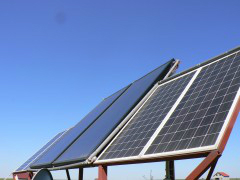The unprecedented economic crisis has the potential to provide a significant boost to the environment. Today, investing in a green economy and green jobs is seen as one of the top priorities for moving beyond the crisis. This unique window of political opportunity for the promotion of green investments should not be missed – and how European public money is to be used to get us out of these economic straits is on the line next week.
, | 13 March 2009

Bankwatch and Friends of the Earth Europe have written to European commission president Jose Manuel Barroso, laying out some key demands for consideration and action from Europe’s leaders at the European Council meeting on March 19-20.
A time of resource scarcity, when the EU is facing its largest economic crisis in the last 50 years, is no time to make poorly thought-out investments in large transport and energy projects but should instead be all about investing in smart spending such as energy efficiency and renewable energy projects.
CEE Bankwatch Network and Friends of the Earth Europe are calling for a EU Recovery Plan that includes:
Provision for increased transparency and publicity of major projects and advanced payments
Increased transparency and publicity of accelerated public money for large infrastructure projects is urgently needed in member states for the application, assessment, selection and monitoring of these projects. The need for this is fully in line with the EC commitments within the European Transparency Initiative1 for improved transparency over EU funds. This is also a way to enforce more effective scrutiny over EU spending and prevent misuse and conflicts of interests over EU spending. Our concerns with this issue are of particular relevance for the new member states, where a number of corruption cases and undue use of the Structural and Cohesion Funds have been registered.
Provision for a mid-term assessment of the changes in EU funds regulations
Facing resource scarcity and economic crisis requires urgent action but also an evaluation of the effectiveness of remedies. Short-term interventions should be “smart” and must guarantee long-term positive effects for the EU economy, employment opportunities and the well-being of all people living in Europe. A mid-term assessment should be carried out against criteria such as sustainable job creation, compliance with environmental law, climate impact and resource efficiency. We realise that large infrastructure projects are the standard recipe for boosting public spending, but EU taxpayers’ money should ultimately be channeled into sound and justified projects which will reap the desired development effects.
Obligatory 15 percent allocation of EU structural funds for energy efficiency/ renewables (EE/RES)
In the current financial perspective 2007-2013, EU funds for EE/RES across the EU-27 account for only EUR 9 billion euro, less than 3 percent of the total. In the new member states this figure is 4.2 billion (approximately 2.4 percent). Considering also the weak share of RES investments in direct EU budget spending as part of the Recovery Plan (just EUR 500 million), the allocations for RES/EE from the EU funds are now even more vital. The political commitment towards a low carbon future and green jobs must be financially supported by an allocatio of at least 15 percent allocation from the EU funds for EE/RES. For our countries facing an economic crisis, EE/RES measures will reap numerous benefits for regional development, securing energy independence, job creation, business opportunities, reducing energy bills and curbing CO2 emissions. Without concrete action plans for the stimulation of RES/EE investment from EU funding sources, the investment potential in these vital areas cannot materialise.
Conditionality of financial aid to auto industry tied to environmental criteria
Financial aid to automakers should be seen as an opportunity to increase the fuel efficiency of cars and green the industry, thereby ensuring longer-term sustainability. Criteria for meeting environmental targets need to be included in any financial package given to the car industry, such as greater reductions in CO2 emissions and increases in fuel efficiency. Furthermore, we do not support proposed scrapping schemes, which have little environmental benefit and may actually do more harm in the long run. The adoption of any such schemes must be linked to the purchase of replacement vehicles with lower CO2 emissions.
Never miss an update
We expose the risks of international public finance and bring critical updates from the ground – straight to your inbox.
Institution: EU Funds
Theme: Energy & climate | Transport | Resource efficiency
Tags: Cohesion Policy | EU funds | cars | economic crisis | energy efficiency | green investments
